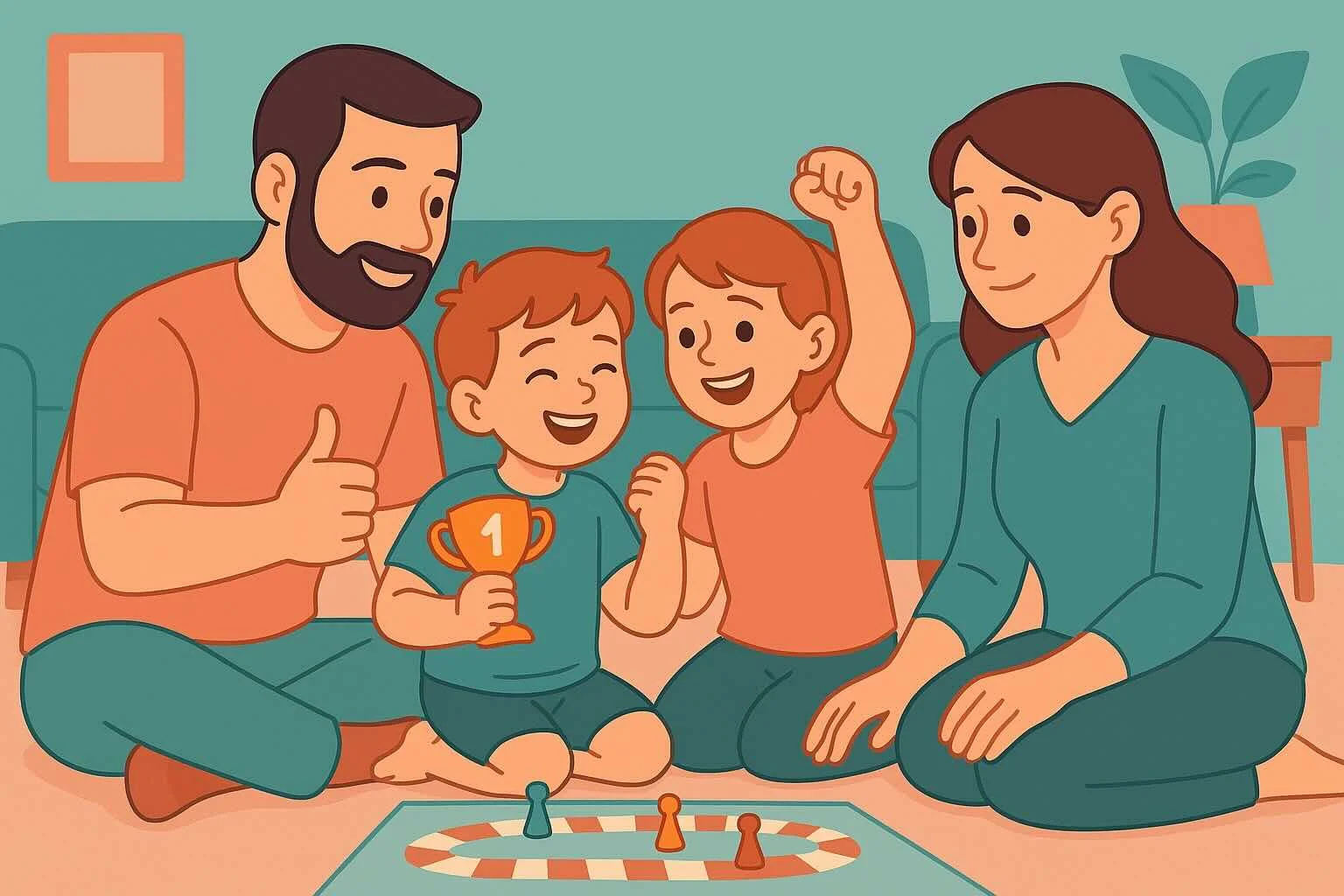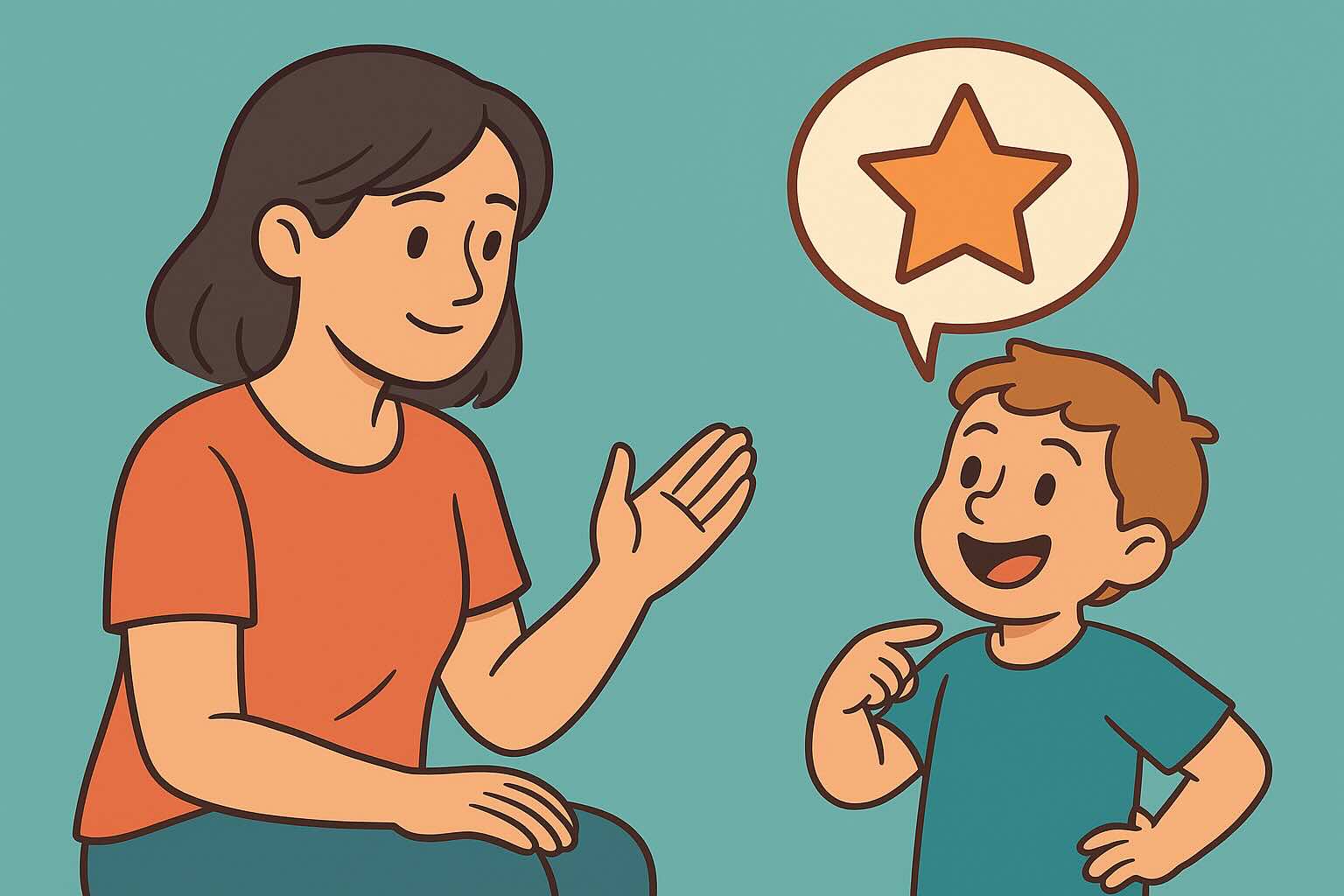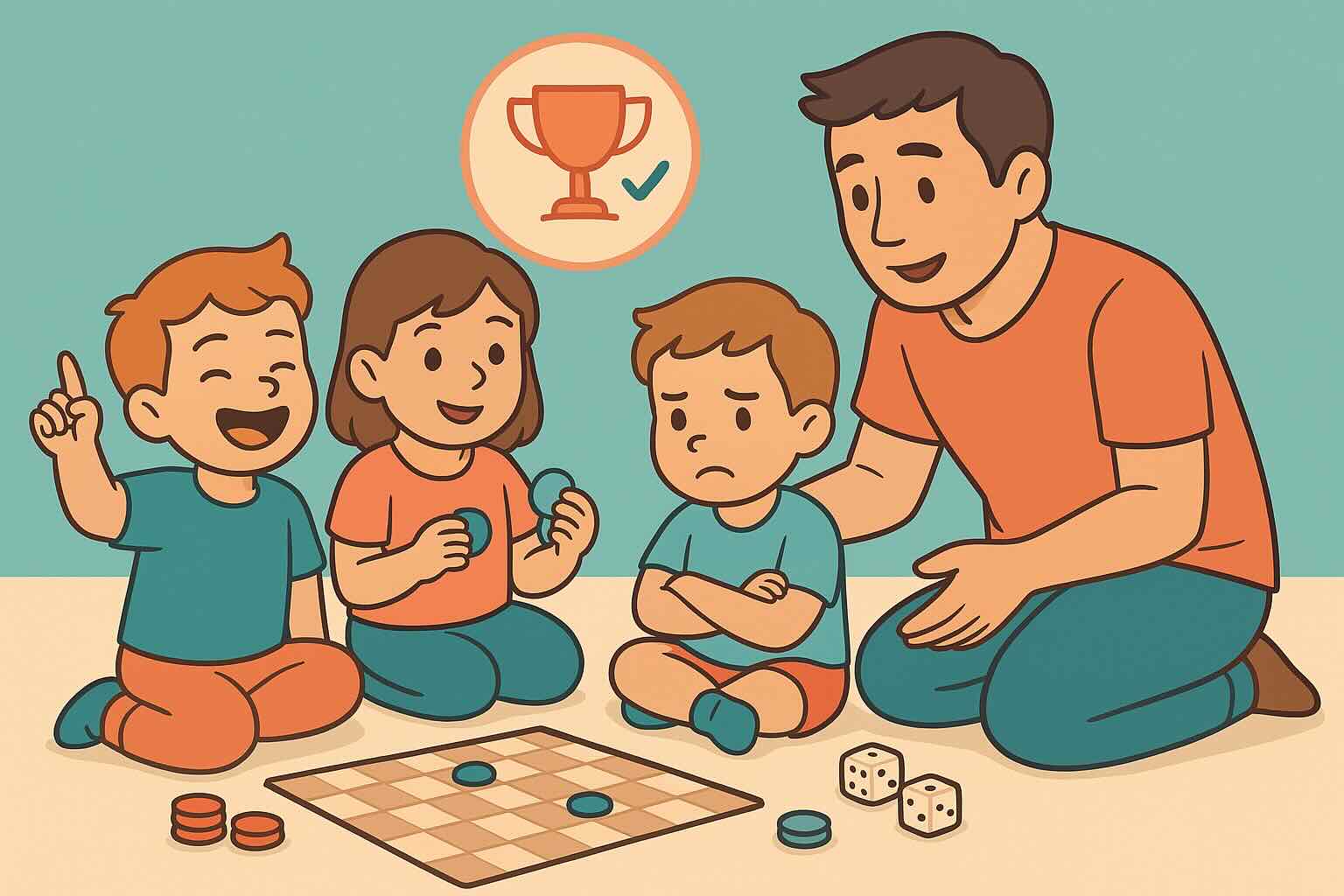How to Help Your Competitive Child: 8 Ways

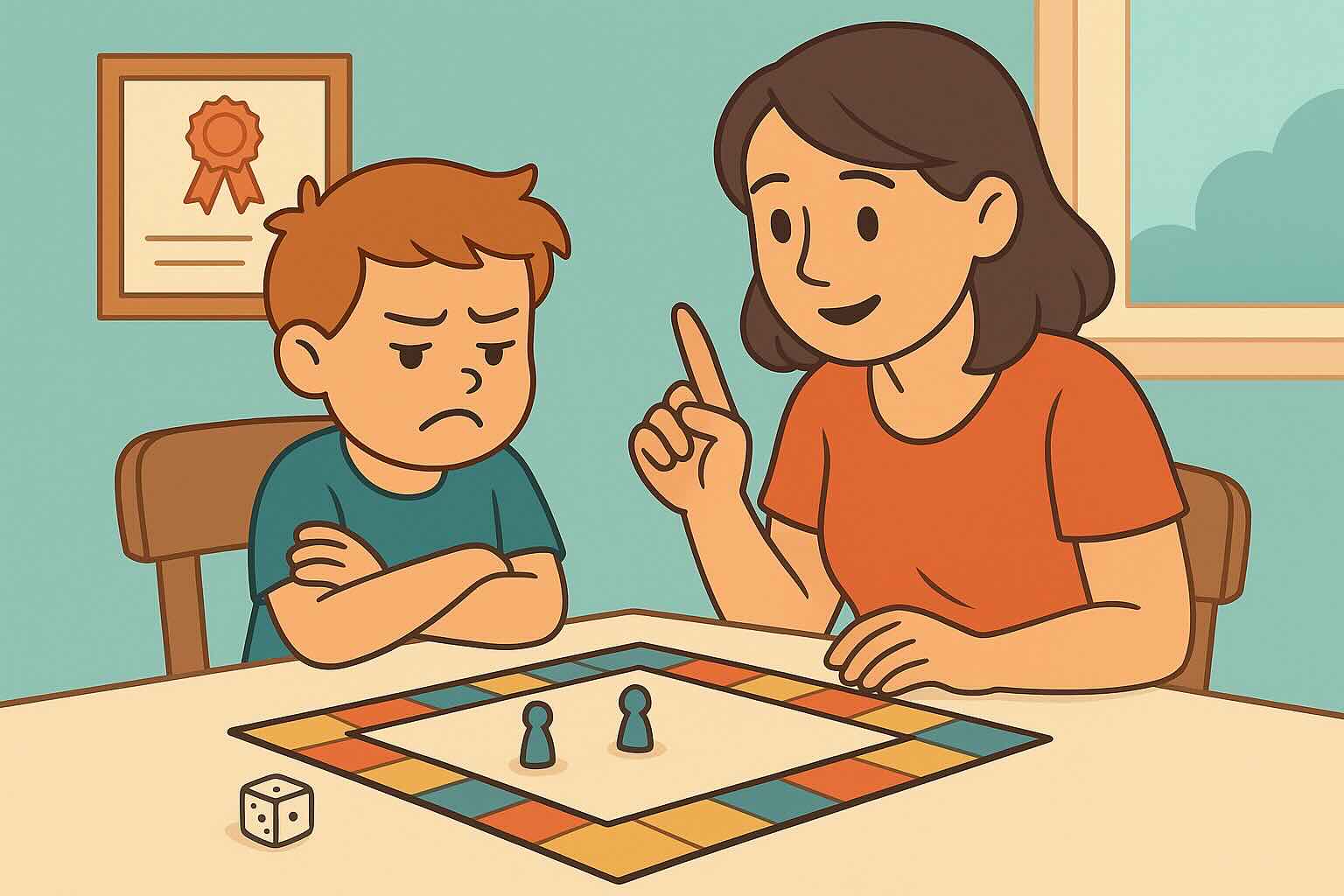
If your child treats every game like a life-or-death battle, celebrates wins by putting others down, or melts down completely when they lose, you're dealing with extreme competitiveness. While competitiveness itself is a wonderful trait, when winning becomes the only reason to play and losing feels devastating, it's time for a different approach.
This comprehensive guide provides evidence-based strategies from child development research to help your competitive child between ages 3-7 develop healthy emotional regulation around winning and losing. No more walking on eggshells around games—just practical tools to transform intense reactions into balanced emotional responses.
For related challenges, also check out our guides on dealing with child bragging and teaching good sportsmanship. You may also find our guides on sibling teasing and social challenges helpful.
What You'll Learn in This Guide
- Why Children Become Extremely Competitive - The 3 main underlying causes
- Realistic Statistics - How common intense competitiveness actually is
- The Reflection Method - Building self-awareness through calm conversations
- Preparation Scripts - Exactly what to say before games and activities
- In-the-Moment Strategies - How to handle meltdowns and extreme reactions
- Age-Specific Approaches - Different techniques for ages 3-4, 5-6, and 7+
- Long-Term Success Stories - How families transformed their competitive dynamics
Estimated reading time: 12 minutes
Understanding Your Competitive Child: The 3 Main Causes
Cause 1: Natural Competitive Temperament
Some children are simply wired to be highly competitive. It's part of their innate personality, and there's absolutely nothing wrong with this trait. Competitive children often become high achievers, goal-setters, and persistent problem-solvers.
However, balance is crucial. Your naturally competitive child needs to learn that:
- Winning feels great AND losing doesn't define their worth
- Effort and improvement matter as much as outcomes
- Other people's success doesn't diminish their own abilities
- Games can be fun even when they don't win
Cause 2: Rigid Thinking Patterns
Some children struggle intensely with competitiveness because they're naturally more rigid in their thinking. They want things to work exactly one way—their way—and when reality doesn't match their expectations, they fall apart.
Signs of rigid thinking in competitive situations:
- Extreme distress when games don't go as planned
- Difficulty adapting to rule changes or unexpected outcomes
- Meltdowns over small setbacks during play
- Wanting to quit immediately if they're not winning
- Needing to control every aspect of game setup
Cause 3: Underlying Feelings of Inferiority or Jealousy
Sometimes extreme competitiveness masks deeper emotional needs. Your child may be using winning as a way to prove their worth or superiority because they're actually feeling:
- Jealous of siblings or friends
- Inferior or "not good enough"
- Pressure to perform or please adults
- Anxiety about their abilities or place in the family
Important: These feelings are completely normal and don't reflect poor parenting. Around ages 4-6, children naturally begin comparing themselves to others as part of healthy development.
The Science Behind Competitive Behavior in Young Children
Developmental Factors (Ages 3-7)
During this crucial period, several developmental changes contribute to competitive behavior:
Cognitive Development:
- Beginning to understand rules and fair play concepts
- Developing ability to compare their performance to others
- Learning cause-and-effect relationships in games and sports
- Building memory for past wins and losses
Social-Emotional Growth:
- Forming early concepts of self-worth and identity
- Learning to navigate peer relationships and social hierarchies
- Developing emotional regulation skills (still very much in progress)
- Beginning to understand others' perspectives (theory of mind)
Physical Development:
- Gaining motor skills that affect game performance
- Experiencing varying rates of physical development compared to peers
- Building coordination and confidence in physical activities
Normal vs. Concerning Competitive Behaviors
Normal competitive behaviors:
- Wanting to win and feeling disappointed when losing
- Getting excited about victories and showing pride
- Occasional tears or frustration after difficult losses
- Bouncing back relatively quickly with adult support
- Still able to enjoy parts of games even when not winning
Concerning behaviors that warrant additional support:
- Meltdowns lasting longer than 10-15 minutes after losses
- Refusing to participate if they can't be guaranteed to win
- Mean or aggressive behavior toward others who win
- Inability to celebrate others' successes
- Physical aggression during or after games
- Persistent statements like "I'm the worst" or "I never win"
- Competitiveness interfering with friendships for over 2 months
The Reflection Method: Building Self-Awareness in Your Competitive Child
This evidence-based approach uses calm, ongoing conversations to help your child understand their emotions and develop better coping strategies. Conversations happen during calm moments only—never immediately after a meltdown.
Step 1: Connect Through Validation
Start by acknowledging the positive aspects of their competitive nature:
For naturally competitive children: "I've been thinking about something. You are very competitive. That means you love to win, and being competitive is actually a wonderful thing. I love watching you try so hard and care so much about doing your best."
For rigid thinkers: "I've noticed that you really like when things go your way, when you have an idea in your head about what will happen and then it happens in real life. That feels really good to you."
For children struggling with jealousy/inferiority: "I'm wondering if sometimes you feel a little jealous of [sibling/friend/classmate]. That's totally okay - everyone feels jealous sometimes, and there's nothing wrong with those feelings."
Step 2: Reflect on Recent Situations
Help your child recall and process recent challenging moments:
"Remember yesterday when we were playing Monopoly and you lost? What happened? Yeah, you got very upset and threw the game pieces. That was tough for both of us. We were both feeling lots of big emotions."
Key principles for reflection:
- Describe events like you're narrating a movie—no judgment
- Include your own emotions and reactions honestly
- Focus on facts, not interpretations
- Allow your child to fill in details and share their perspective
Step 3: Set Clear Boundaries
Establish what behaviors are and aren't acceptable:
"When you lose a game, you cannot throw things or break the game. You cannot tell people you hate them because you're angry about losing. I think you already know this, but let's be really clear about it."
Boundary-setting principles:
- Use simple, clear language
- State what CANNOT happen, not just what you prefer
- Acknowledge that they likely already know these rules
- Avoid over-explaining or lecturing
Step 4: Validate Emotions and Encourage Coping Skills
"I know how bad it feels when you lose. In that moment, it might feel like the worst thing ever, maybe like you'll never win again. It's not really that, but it sure feels that way. I totally get it."
"Even when it feels so big and so strong, we need to remember what else is true—that you WILL win again and you're not a loser. That's what we're going to work on together."
Step 5: Collaborative Problem-Solving
Instead of giving all the solutions, involve your child in finding strategies:
"What do you think you can do to help yourself the next time you lose? Because losing will happen again—not always, but sometimes. Let's think about it together."
Possible solutions to guide them toward:
- Using words to express feelings ("I'm really disappointed")
- Taking breaks when they feel themselves getting upset
- Physical movement (jumping jacks, walking around)
- Self-talk strategies ("I'm okay even if I lose")
- Asking for help or comfort from adults
Preparation Scripts: Setting Your Child Up for Success
The key to helping competitive children is preparation. Before any situation where winning/losing might occur, use these evidence-based scripts:
Basic Preparation Script
"We're about to play [game/sport]. Remember what we've been working on? Sometimes you win and that feels great. Sometimes you lose and that doesn't feel good. If you lose today, will you break something or scream? No, you cannot do that. What can you do instead?"
"Yes, you can tell me how you're feeling. You can help yourself feel better by [specific strategy you've practiced]. It won't be easy, but I know you can do it. I'm going to be right here to help you."
Advanced Preparation (Ages 5-7)
"Before we start, let's think about this game. What's your goal? Just to win, or also to have fun and try your best? What if the other person is really good at this game? How will you feel if they win? What can you tell yourself if that happens?"
Sibling Game Preparation
"You and your sister are about to play together. One of you will win and one will lose. The person who wins—how should they act? The person who loses—what can they do to help themselves feel better? Let's practice both."
In-the-Moment Strategies: Managing Meltdowns and Extreme Reactions
During a Competitive Meltdown
Step 1: Stay Close and Supervise
- Position yourself nearby but don't hover
- Watch for escalation warning signs
- Be ready to intervene before things get out of hand
Step 2: Use Calm, Clear Language "I can see you're really upset about losing. Your feelings make sense. AND throwing things is not okay. Let's take a break."
Step 3: Don't Try to Fix or Reason Yet
- Avoid explaining why losing isn't so bad
- Don't minimize their feelings
- Simply provide calm, supportive presence
Step 4: Offer Structured Support "You can be upset for as long as you need to. When you're ready, we can talk about what happened and what you can do differently next time."
After the Storm Passes
Step 1: Acknowledge Any Positive Efforts "That was really hard, but I noticed you didn't hit anyone even though you were very angry. That took a lot of self-control."
Step 2: Reflect Together "What was the hardest part about losing that game? What helped you calm down? What might you try differently next time?"
Step 3: Reinforce the Learning "Losing doesn't feel good, and that's normal. AND you're still a great kid who's learning and growing. We'll keep practicing this together."
Age-Specific Strategies for Competitive Children
Ages 3-4: Building Basic Emotional Vocabulary
At this age, focus on simple emotional identification and basic self-regulation:
Strategies that work:
- Use emotion words consistently ("frustrated," "disappointed," "proud")
- Keep games short and success achievable
- Offer lots of physical comfort after disappointments
- Practice basic breathing or counting together
- Use visual aids like feeling faces or emotion cards
Script examples:
- "You're feeling mad because you didn't win. Mad is a feeling that goes away."
- "Let's count to five together while you feel your mad feelings."
- "Your body is telling you that you're disappointed. That's okay."
Ages 5-6: Developing Perspective and Empathy
Children this age can begin to understand others' feelings and more complex emotional concepts:
Strategies that work:
- Introduce the concept that multiple people can be good at things
- Practice celebrating others' successes
- Use simple role-playing during calm moments
- Help them identify physical sensations that come before big emotions
- Begin teaching the difference between effort and outcome
Script examples:
- "When your friend wins, how do you think they feel? How can we show them we're happy for them?"
- "You worked really hard in that game. That's something to be proud of, even though you didn't win."
- "What does your body feel like when you start getting upset about losing?"
Ages 7+: Building Complex Emotional Regulation
Older children can handle more sophisticated emotional concepts and self-regulation strategies:
Strategies that work:
- Discuss the relationship between practice and improvement
- Introduce growth mindset concepts
- Help them develop personal goals beyond just winning
- Practice advanced self-talk strategies
- Begin discussing the difference between healthy and unhealthy competition
Script examples:
- "What did you learn about yourself during that game, besides whether you won or lost?"
- "How do you think you've improved at this game compared to last month?"
- "What would you tell a friend who was feeling the way you're feeling right now?"
Family Strategies: Creating a Healthy Competitive Environment
Modeling Healthy Competition
Your child learns more from watching you than from anything you say. Model the behavior you want to see:
When you win something:
- "I won that game! I feel proud of how hard I tried."
- "That was fun! I liked playing with you even though you didn't win this time."
- "Good game! You did some really smart moves."
When you lose:
- "I'm disappointed I lost, and that's okay. I had fun playing."
- "You played really well! I'm proud of how hard you tried."
- "Losing doesn't feel good, but I can handle these feelings."
Family Game Modifications
Make games more cooperative:
- Play team games against a common challenge
- Focus on beating previous family records
- Create games where everyone can succeed in different ways
- Use timers instead of direct competition when possible
Adjust difficulty appropriately:
- Give younger children slight advantages
- Change rules to make games more balanced
- Focus on effort and improvement over outcomes
- Celebrate small victories for everyone
Building Emotional Intelligence Through Family Discussions
Regular family conversations help normalize the full range of competitive emotions:
Weekly check-ins:
- "Let's each share something we're proud of this week and something that felt challenging."
- "Who can tell about a time they felt jealous this week? How did they handle it?"
- "What's something each of us is getting better at? What's something we're still working on?"
Realistic Expectations: What Change Actually Looks Like
Timeline for Improvement
Weeks 1-2: Awareness Building
- Your child may initially resist conversations about competition
- Emotions might actually seem bigger as you start addressing them
- Focus on having reflection conversations and building awareness
- Don't expect immediate behavior change
Weeks 3-4: Beginning Implementation
- Start seeing occasional use of coping strategies
- Meltdowns may still be intense but slightly shorter
- Your child might surprise you with good moments
- Consistency is crucial during this phase
Weeks 5-8: Noticeable Progress
- More frequent use of appropriate coping strategies
- Faster recovery from disappointing losses
- Occasional self-advocacy ("I'm feeling upset about this")
- Still expect setbacks and difficult days
Months 3-6: Solid Improvement
- Generally shorter, less intense reactions to losing
- Beginning to celebrate others' successes appropriately
- Using learned strategies more independently
- Overall improvement in competitive social interactions
What Success Really Looks Like
Success does NOT mean:
- Your child never gets upset about losing
- They become passive or stop caring about winning
- All competitive situations become easy
- They never need adult support during difficult moments
Success DOES mean:
- Faster recovery from disappointment
- Appropriate expression of competitive feelings
- Ability to enjoy games even when not winning
- Better relationships with peers during competitive activities
- Developing internal motivation beyond just beating others
When to Seek Professional Help
Red Flags That Warrant Professional Support
- Competitive behaviors interfering with friendships for more than 2-3 months
- Physical aggression toward others during or after games
- Persistent refusal to participate in group activities due to fear of losing
- Extreme anxiety or distress that lasts hours after competitive situations
- Family functioning significantly impacted by child's competitive needs
- Self-harm behaviors when losing (hitting self, head banging)
- Persistent negative self-talk ("I'm stupid," "I'm the worst at everything")
- Competitive behaviors worsening rather than improving with consistent intervention
Types of Professional Support
Child psychologists can help with underlying anxiety, self-esteem issues, or emotional regulation challenges
Occupational therapists may help if sensory processing issues contribute to competitive stress
Family therapists can assist with family dynamics and sibling competition issues
School counselors can provide support for competitive challenges in academic or sports settings
Real-Life Success Stories
Emma's Story: From Meltdowns to Balanced Competition
"Emma used to have 20-minute meltdowns whenever she lost any game. Board games became family battlegrounds. We started having regular conversations about her competitive feelings during calm moments, and prepared her before every game with specific scripts about what she could do if she lost. It took about 6 weeks to see real change, but now she still gets disappointed when she loses—which is normal—but recovers in 2-3 minutes instead of having huge meltdowns. She even started saying 'good game' to her brother after particularly tough losses."
Marcus's Story: Learning to Celebrate Others
"Marcus would get so angry when his friends won at anything that playdates became stressful. We worked on the concept that other people being good at things doesn't take away from what he's good at. We practiced celebrating others during family games, and role-played different scenarios. The breakthrough came when he started asking 'What are you good at?' to his friends instead of always trying to prove he was better. It took about 3 months, but his friendships improved dramatically."
Sofia's Story: Rigid Thinking to Flexible Fun
"Sofia needed everything to go exactly her way during games, and any unexpected change would cause a complete meltdown. We started working on flexibility during non-competitive times, then gradually applied it to games. We'd practice 'surprise rule changes' during family game night and celebrate her ability to adapt. She went from being unable to handle any game variation to actually suggesting her own rule modifications. The key was lots of preparation and celebrating small improvements."
Your 8-Week Action Plan for Competitive Children
Weeks 1-2: Understanding and Awareness
- Have 2-3 reflection conversations about competition
- Start identifying your child's specific competitive triggers
- Practice staying calm during your child's competitive meltdowns
- Begin using basic emotion labeling ("You seem frustrated about losing")
Weeks 3-4: Preparation and Boundaries
- Implement preparation scripts before competitive activities
- Set clear boundaries about acceptable/unacceptable competitive behaviors
- Start teaching basic coping strategies (deep breathing, taking breaks)
- Practice these strategies during calm, non-competitive moments
Weeks 5-6: Active Implementation
- Use preparation scripts consistently before games
- Intervene early when you see escalation warning signs
- Celebrate any use of appropriate coping strategies
- Continue reflection conversations, building on previous discussions
Weeks 7-8: Fine-Tuning and Independence
- Encourage your child to self-advocate ("I'm feeling upset about this")
- Practice celebrating others' successes during family activities
- Begin transferring strategies to school and peer situations
- Maintain consistent approach while allowing more independence
Building Long-Term Emotional Intelligence Through Competition
The Bigger Picture: Life Skills Beyond Games
Every time you help your child navigate competitive feelings appropriately, you're building crucial life skills:
Emotional regulation: Learning to manage disappointment and excitement appropriately Social skills: Understanding how their behavior affects others during competitive situations Resilience: Developing the ability to bounce back from setbacks and keep trying Empathy: Learning to celebrate others' successes and support friends during their struggles Growth mindset: Understanding that abilities can improve with effort and practice
Reframing Competition as Learning
Help your child see competitive situations as opportunities for growth rather than just chances to prove superiority:
- "What did you learn about yourself during that game?"
- "How did you show good sportsmanship today?"
- "What would you like to practice before we play this game again?"
- "How did it feel to encourage your teammate when they were struggling?"
Key Takeaways: Supporting Your Competitive Child
- ✅ Competitiveness is a positive trait that needs balance and emotional regulation
- ✅ Three main causes: natural temperament, rigid thinking, or underlying insecurity
- ✅ Reflection conversations during calm moments are more effective than in-the-moment lectures
- ✅ Preparation scripts before competitive activities prevent many meltdowns
- ✅ Focus on effort and improvement, not just winning and losing
- ✅ Model healthy competition through your own behavior and reactions
- ✅ Expect gradual improvement over 6-8 weeks, not immediate change
- ✅ Professional help is available for persistent or concerning behaviors
- ✅ Competition teaches valuable life skills when approached appropriately
Remember: Your goal isn't to eliminate your child's competitive spirit, but to help them channel it in healthy, socially appropriate ways. With patience and consistency, your competitive child can learn to embrace both winning and losing as part of growth and learning.
This article is based on developmental psychology research and clinical experience with competitive children. Individual results vary based on child temperament, family consistency, and environmental factors. Consult with your pediatrician or a child psychologist if competitive behaviors significantly impact daily functioning or relationships.
Challenging Moments Support
Access step-by-step parenting strategies, quick tips, and age-specific guidance for difficult situations when you need it most.
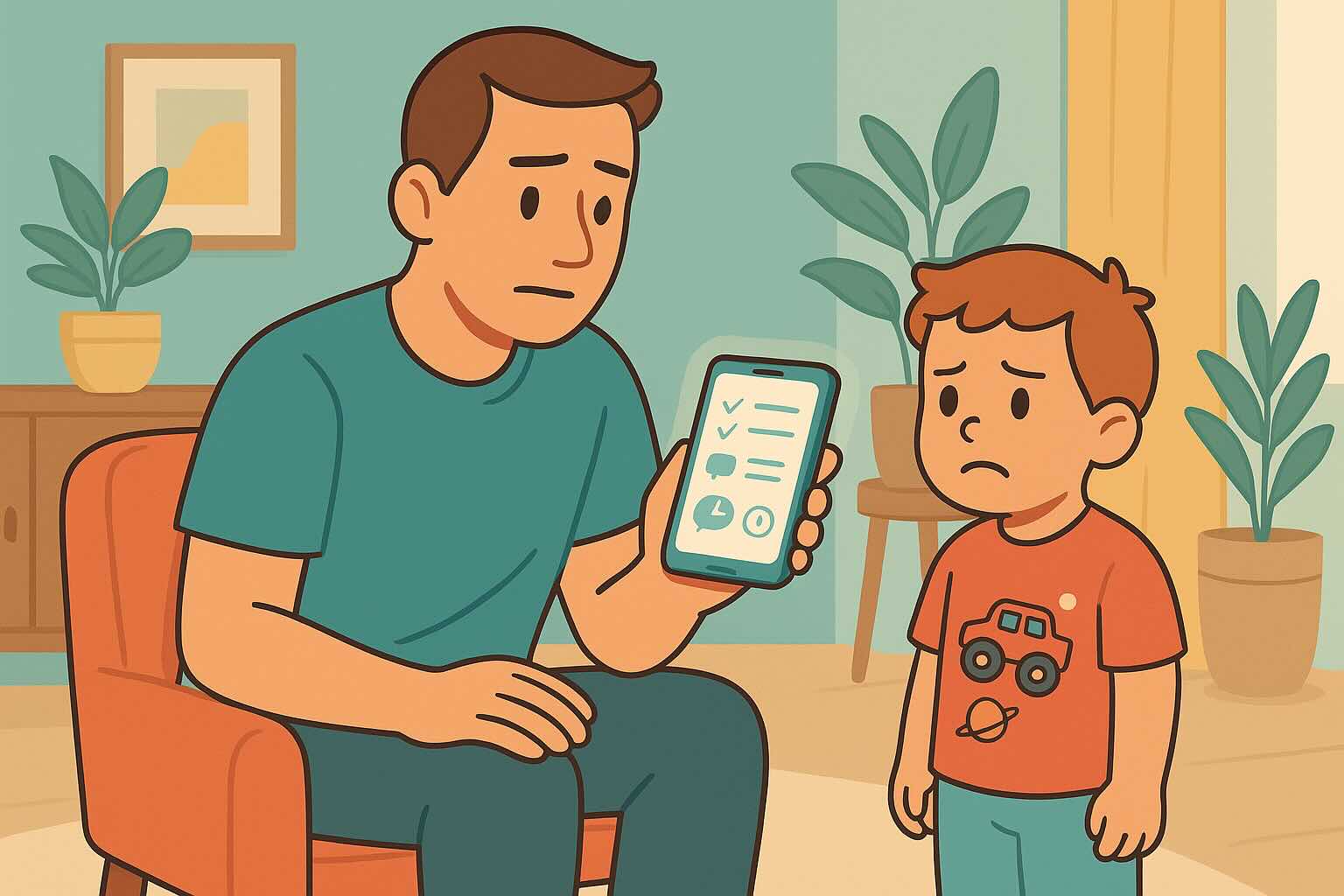
Competitive Child Toolkit
Complete guide to managing winning and losing with preparation scripts, reflection methods, and age-specific strategies.
Frequently Asked Questions
Need personalized support?
RootWise's AI coach can provide tailored strategies for your specific situation, available 24/7 when you need it most.
Learn More About AI Coaching →